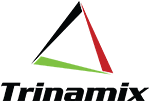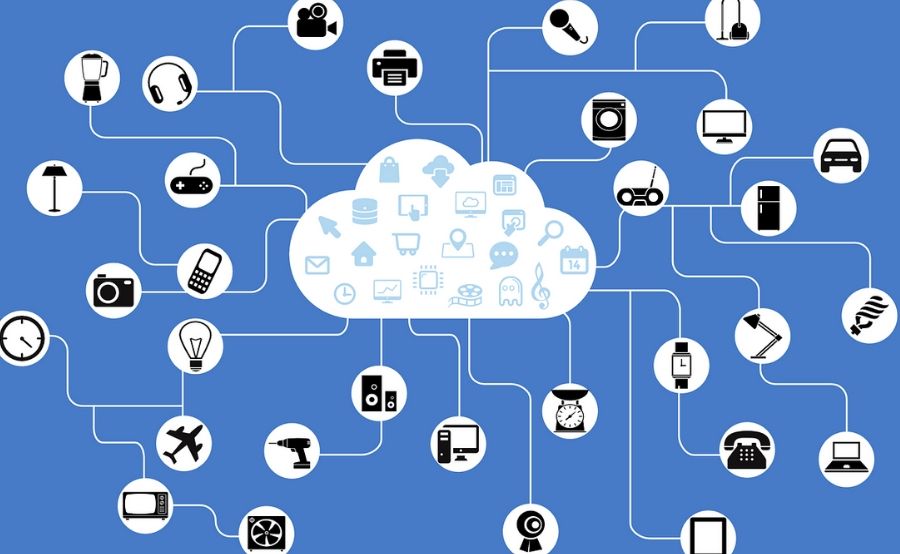
Introduction
The internet of things, or IoT, is a system of interrelated computing devices, mechanical and digital machines, objects, animals or people that are provided with unique identifiers (UIDs) and the ability to transfer data over a network without requiring human-to-human or human-to-computer interaction. In 1999, British technologist Kevin Ashton came up with the term Internet of Things (IoT) to define a network that not only connects people, but also the objects around them. At the time, most people thought this was the stuff of sci-fi films. Today, the Internet of Things – a vast network of smart objects which work together in collecting and analyzing data and autonomously performing actions – is becoming a reality, thanks to the machine-to-machine communication (M2M) technology.
IoT Installed Base
An estimated 23.14 billion IoT connected devices are installed worldwide as of 2018. This technology has gained massive traction in various spheres like healthcare, banking, retail, manufacturing, consumer goods, etc. Businesses all over the world are looking for possible applications of IoT.
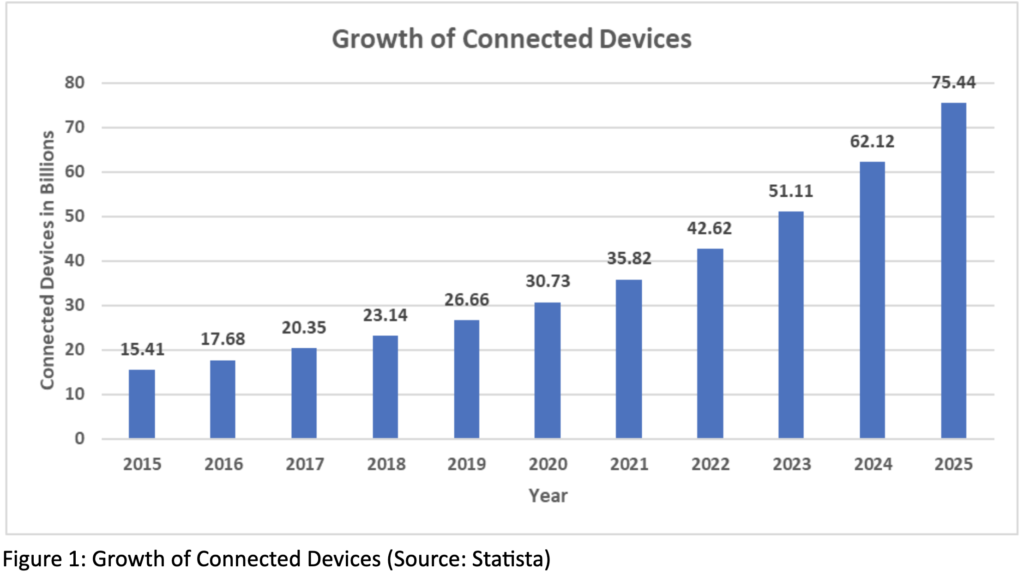
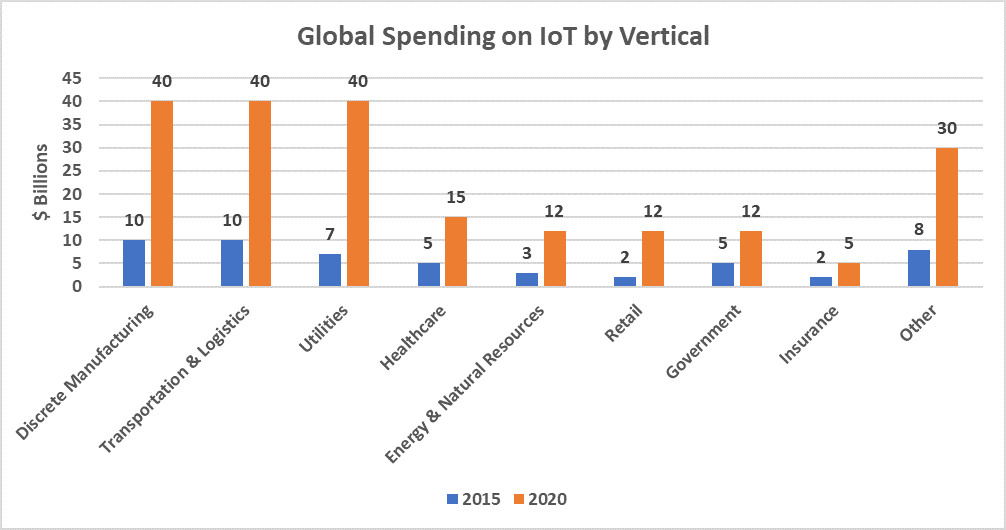
Use Case: Track and Trace using IoT and Blockchain
A supplier is responsible for bulk-shipping products to geographically dispersed customers. For quality control purposes, it is imperative that the temperature of the shipment be controlled during the entire shipping process. As a means of tracking the shipment through the delivery process, temperatures and geo-location must be reported at frequent intervals, along with a record every time the cargo changes hands during the shipping process (trans-shipment / change of custody).
The above scenario tracks a shipment from the initial supplier to its ultimate destination, reporting temperature and location information at regular intervals. The sensor will report immediately with a violation and report custody handoffs. The shipment consists of pallets of goods, which receives an inexpensive sensor/tag capable of tracking temperature. A Gateway device records the custody, location, and temperature sensor information written to a Blockchain ledger (example, Oracle Blockchain platform) and processed by IoT Analytics Platform. Interested parties can view shipment location & temperature data via a custom app made available on a mobile/smart device.
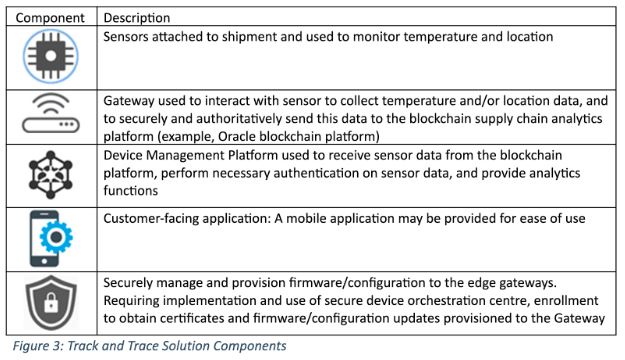
Execution Details
A supplier prepares a pallet of goods for shipment, adding a sensor with the ability to monitor temperature and geo-location. Each sensor contains a unique identifier that is associated with the pallet to which it is affixed.
A freight transporter picks up the shipment at the supplier, scanning the sensor prior to departing the factory. The gateway app reads the initial temperature and location data, and writes the following information to the analytics platform/blockchain:
- Supplier ID Number
- Carrier ID Number
- Shipment ID Number
- Temperature Reading
- Geo-location Coordinates
During transport, the gateway collects regular sensor readings, ensuring the temperature does not exceed the pre-defined ranges. The gateway takes regular geo-location readings, ensuring the coordinates do not leave the predetermined Geo-Fencing guidelines. If either the temperature or location rules are violated, the gateway writes the relevant information to the analytics platform/blockchain.
The shipment arrives at its destination, where the receiver takes a final scan of the sensors, writing the relevant information to the analytics platform/blockchain. Additionally, the change in custody is noted to the blockchain, and payment is delivered via Smart Contracting parameters.
Example of Smart Contract in this case using Blockchain
Example of contractual terms that could be incorporated into a smart contract includes the following:
The temperature at which the temperature-sensitive pallets are kept during the shipment process. If the pallets are always kept within a certain desired temperature range, the carrier receives full payment. If the pallets reach a temperature considered a dangerous but tolerable range, the carrier receives partial payment. If the pallets reach a temperature outside the bounds of the tolerable range, no payment is awarded.
The shipment time for each leg of the shipment process. Each carrier commits to completing its portion of the shipment process within a certain length of time. The amount of time differs depending on the distance and mode of travel. Failure to complete the shipment within the prescribed time period results in a reduction in payment to the carrier.
Oracle blockchain platform provides significant benefits including enhanced security, improved traceability, and streamlined consensus. Informed by blockchain transactions, AI, machine learning, and IoT, prebuilt industry-specific dashboards on Oracle blockchain show real-time results, analytics, and alerts that are critical for this use case.
Conclusion: Why Track and Trace?
Among industries spending on IoT, the track-and-trace sector is expected to have the largest spending growth — a 24.2% increase — on IoT devices between 2017 and 2023. Inventory and supply chain management is expected to see a 20.2% increase in spending during the same time period, according to a report from Forrester.
Deloitte argued in 2015, “information provided by IoT deployments allows supply chains to invest less in eliminating variation because timely and effective responses are now possible, and instead to use variation as a foundation for new types of competitive advantage and even as a driver of innovation.”
Noha Tohamy, a vice president of supply chain at Gartner, argued a similar point in 2015. “With the IoT, the supply chain will have unprecedented access to data valued by internal and external stakeholders,” Tohamy said. “This presents an opportunity for supply chain groups to co-develop new information-based solutions for individual customers or markets.”
Earlier this year, the Port of Rotterdam Authority started using an IoT application to help manage its shipping operations. It uses sensors around the port to collect water and weather information to help with ship scheduling.
This kind of sensor deployment provides operators with a real-time overview of what’s happening at the port. All this data collection can also help with further technology implementation in the future — “This lays the foundation to facilitate autonomous shipping in the Port of Rotterdam in the future,” the port said in a press release earlier this year.
Meanwhile, the carriers hauling containers are also looking to IoT to better understand their operations. MSC has equipped 50,000 dry van containers with IoT devices to track the location, temperature, vibration and other aspects of a container’s journey. This will give MSC greater transparency into the journey of a container, but it also expects it to help expedite the customs process.
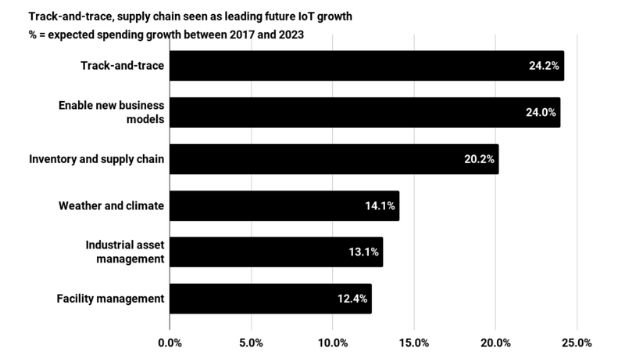
Oracle in Advanced platform technologies
IOT and blockchain technologies started taking shape once the Big data related technologies stabilized and AI/ML technologies evolved. Major platform solution providers realized that these underlying technologies now can be packaged based on common industry use cases providing easy means to customer to achieve significant business benefits by making data available to solution providers’ cloud and realize quick results. Cloud platforms together with the emerging technologies are proving to be a game changer in this space. Oracle has started releasing IOT/AI/Blockchain-based prepackaged cloud solution platforms over the last 2 years that provide significant benefits to customers who look for improved traceability and streamlined consensus including enhanced security in the platforms. Informed by blockchain transactions, AI, machine learning, and IoT, prebuilt industry-specific dashboards on Oracle blockchain show real-time results, analytics, and alerts that are critical for this use case.
Trinamix as a value partner in Industry 4.0 Initiatives
Trinamix, the leading solution provider of Oracle cloud platform-based supply chain solutions, is working with Oracle and other partners in Industry 4.0 space, in the United States, APAC and Japan to deliver advanced technology solutions to customers using Oracle IOT, AI and Blockchain apps and other cloud technologies and platforms. Trinamix’s Industry 4.0 Labs are used by customers and network partners to showcase industry-specific use cases that utilize advanced technologies and establish how they can be used by customers in transforming their digital supply chain and get to the next level of visibility and control of their manufacturing and distribution processes. Trinamix is leading multiple customer Proof of Concepts and design thinking initiatives already and is steadily making a niche for itself in the domain. Trinamix offers Industry 4.0 design thinking, Business architecture, Proof of Concepts, adoption Roadmap and value integration engagements along with Oracle IOT/AI/Blockchain apps related implementation services.
Headquartered in California (USA) with offices across the globe, Trinamix is one of the leading solution specialists for Oracle Cloud Applications, Oracle Value Chain planning and E-Business Suite. Trinamix is recognized for customer focus and passion for excellence in solution delivery. Trinamix offers a unique approach of implementation that incorporate best practices for processes and technology making them a leader in implementing Oracle solutions to enable supply chain planning and execution. Visit us at http://www.trinamix.com/ for further information and help.
Disclaimer
This document is produced by Trinamix as general guidance. It is not intended to provide specific advice on your circumstances. If you require advice or further details on any matters referred to, please contact your Trinamix representative.
About the Author

Joydeep is Associate Director – Service Delivery & PMO in Trinamix.
He is a proven IT program portfolio leader with 18 years of experience in healthcare, pharmaceuticals, retail, and technology industries. He has experience in leading large-scale, complex and transformative business investments that apply technology (IoT, blockchain etc) to business opportunities that meet business needs.
He is a graduate of Indian Institute of Technology where he completed his Bachelors with merit based Government scholarships. He completed his MBA from University of Warwick in the UK with a fully paid Commonwealth Scholarship.
Joydeep currently lives in New Jersey with his family.
